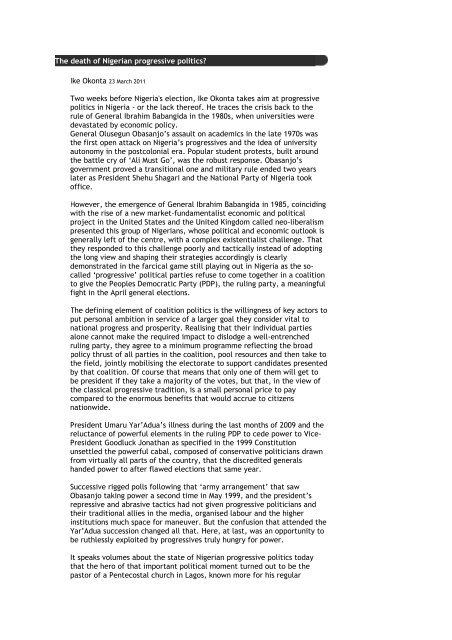April 2011 - Centre for Civil Society - University of KwaZulu-Natal
April 2011 - Centre for Civil Society - University of KwaZulu-Natal
April 2011 - Centre for Civil Society - University of KwaZulu-Natal
You also want an ePaper? Increase the reach of your titles
YUMPU automatically turns print PDFs into web optimized ePapers that Google loves.
The death <strong>of</strong> Nigerian progressive politics?<br />
Ike Okonta 23 March <strong>2011</strong><br />
Two weeks be<strong>for</strong>e Nigeria's election, Ike Okonta takes aim at progressive<br />
politics in Nigeria - or the lack there<strong>of</strong>. He traces the crisis back to the<br />
rule <strong>of</strong> General Ibrahim Babangida in the 1980s, when universities were<br />
devastated by economic policy.<br />
General Olusegun Obasanjo’s assault on academics in the late 1970s was<br />
the first open attack on Nigeria’s progressives and the idea <strong>of</strong> university<br />
autonomy in the postcolonial era. Popular student protests, built around<br />
the battle cry <strong>of</strong> ‘Ali Must Go’, was the robust response. Obasanjo’s<br />
government proved a transitional one and military rule ended two years<br />
later as President Shehu Shagari and the National Party <strong>of</strong> Nigeria took<br />
<strong>of</strong>fice.<br />
However, the emergence <strong>of</strong> General Ibrahim Babangida in 1985, coinciding<br />
with the rise <strong>of</strong> a new market-fundamentalist economic and political<br />
project in the United States and the United Kingdom called neo-liberalism<br />
presented this group <strong>of</strong> Nigerians, whose political and economic outlook is<br />
generally left <strong>of</strong> the centre, with a complex existentialist challenge. That<br />
they responded to this challenge poorly and tactically instead <strong>of</strong> adopting<br />
the long view and shaping their strategies accordingly is clearly<br />
demonstrated in the farcical game still playing out in Nigeria as the socalled<br />
‘progressive’ political parties refuse to come together in a coalition<br />
to give the Peoples Democratic Party (PDP), the ruling party, a meaningful<br />
fight in the <strong>April</strong> general elections.<br />
The defining element <strong>of</strong> coalition politics is the willingness <strong>of</strong> key actors to<br />
put personal ambition in service <strong>of</strong> a larger goal they consider vital to<br />
national progress and prosperity. Realising that their individual parties<br />
alone cannot make the required impact to dislodge a well-entrenched<br />
ruling party, they agree to a minimum programme reflecting the broad<br />
policy thrust <strong>of</strong> all parties in the coalition, pool resources and then take to<br />
the field, jointly mobilising the electorate to support candidates presented<br />
by that coalition. Of course that means that only one <strong>of</strong> them will get to<br />
be president if they take a majority <strong>of</strong> the votes, but that, in the view <strong>of</strong><br />
the classical progressive tradition, is a small personal price to pay<br />
compared to the enormous benefits that would accrue to citizens<br />
nationwide.<br />
President Umaru Yar’Adua’s illness during the last months <strong>of</strong> 2009 and the<br />
reluctance <strong>of</strong> powerful elements in the ruling PDP to cede power to Vice-<br />
President Goodluck Jonathan as specified in the 1999 Constitution<br />
unsettled the powerful cabal, composed <strong>of</strong> conservative politicians drawn<br />
from virtually all parts <strong>of</strong> the country, that the discredited generals<br />
handed power to after flawed elections that same year.<br />
Successive rigged polls following that ‘army arrangement’ that saw<br />
Obasanjo taking power a second time in May 1999, and the president’s<br />
repressive and abrasive tactics had not given progressive politicians and<br />
their traditional allies in the media, organised labour and the higher<br />
institutions much space <strong>for</strong> maneuver. But the confusion that attended the<br />
Yar’Adua succession changed all that. Here, at last, was an opportunity to<br />
be ruthlessly exploited by progressives truly hungry <strong>for</strong> power.<br />
It speaks volumes about the state <strong>of</strong> Nigerian progressive politics today<br />
that the hero <strong>of</strong> that important political moment turned out to be the<br />
pastor <strong>of</strong> a Pentecostal church in Lagos, known more <strong>for</strong> his regular
















